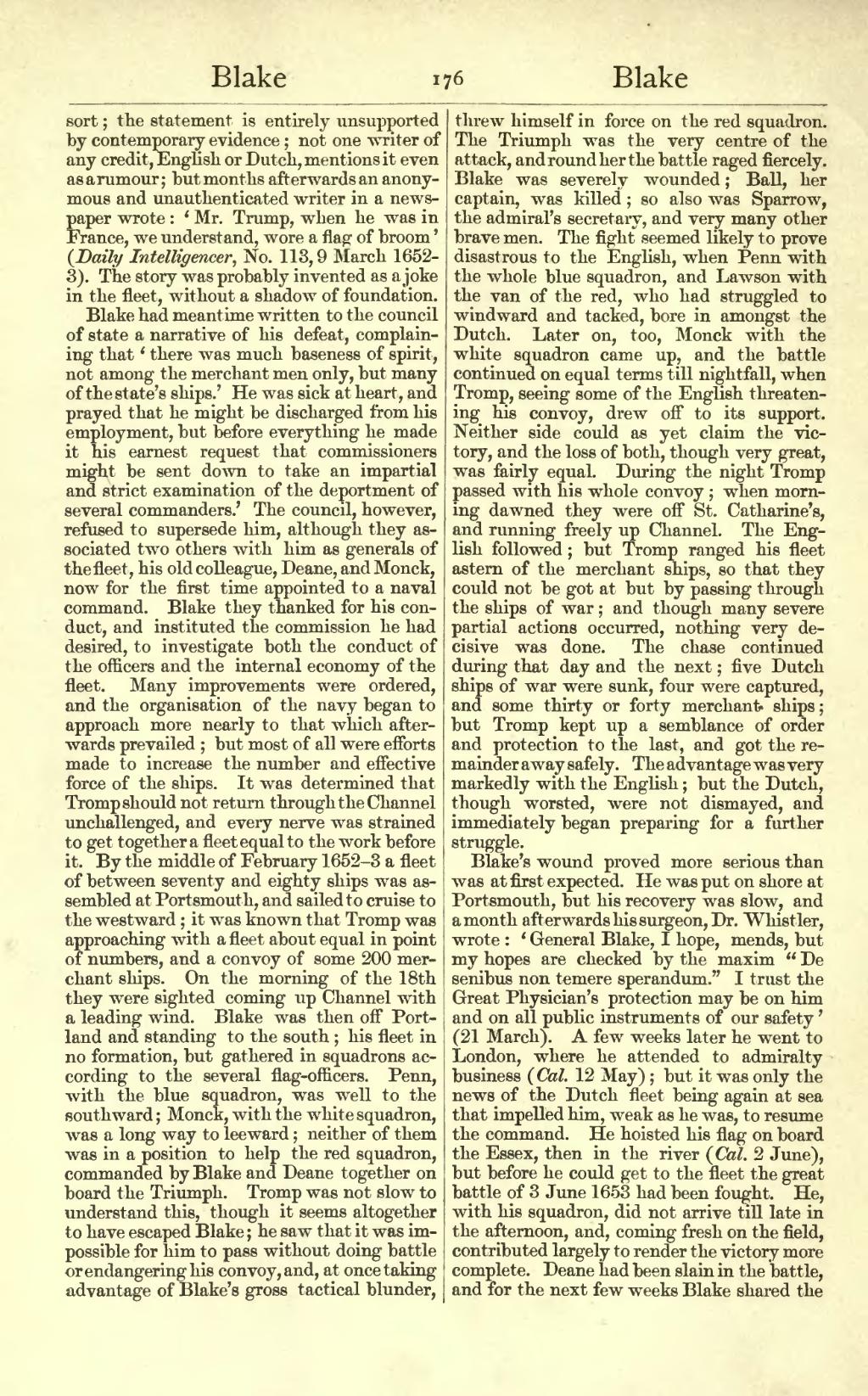sort; the statement is entirely unsupported by contemporary evidence; not one writer of any credit, English or Dutch, mentions it even as a rumour; but months afterwards an anonymous and unauthenticated writer in a newspaper wrote: 'Mr. Trump, when he was in France, we understand, wore a flag of broom' (Daily Intelligencer, No. 1l3, 9 March 1652-3). The story was probably invented as a joke in the fleet, without a shadow of foundation.
Blake had meantime written to the council of state a narrative of his defeat, complaining that 'there was much baseness of spirit, not among the merchant men only, but many of the state's ships.' He was sick at heart, and prayed that he might be discharged from his employment, but before everything he made it his earnest request that commissioners might be sent down to take an impartial and strict examination of the department of several commanders.' The council, however, refused to supersede him, although they associated two others with him as generals of the fleet, his old colleague, Deane, and Monck, now for the first time appointed to a naval command. Blake they thanked for his conduct, and instituted the commission he had desired, to investigate both the conduct of the officers and the internal economy of the fleet. Many improvements were ordered, and the organisation of the navy began to approach more nearly to that which afterwards prevailed; but most of all were efforts made to increase the number and effective force of the ships. It was determined that Tromp should not return through the Channel unchallenged, and every nerve was strained to get together a fleet equal to the work before it. By the middle of February 1652-3 a fleet of between seventy and eighty ships was assembled at Portsmouth, and sailed to cruise to the westward; it was known that Tromp was approaching with a fleet about equal in point of numbers, and a convoy of some 200 merchant ships. On the morning of the 18th they were sighted coming up Channel with a leading wind. Blake was then off Portland and standing to the south; his fleet in no formation, but gathered in squadrons according to the several flag-officers. Penn, with the blue squadron, was well to the southward; Monck, with the white squadron, was a long way to leeward; neither of them was in a position to help the red squadron, commanded by Blake and Deane together on board the Triumph. Tromp was not slow to understand this, though it seems altogether to have escaped Blake; he saw that it was impossible for him to pass without doing battle or endangering his convoy, and, at once taking advantage of Blake's gross tactical blunder, threw himself in force on the red squadron. The Triumph was the very centre of the attack, and round her the battle raged fiercely. Blake was severely wounded; Ball, her captain, was killed; so also was Sparrow, the admiral's secretary, and very many other brave men. The fight seemed likely to prove disastrous to the English, when Penn with the whole blue squadron, and Lawson with the van of the red, who had struggled to windward and tacked, bore in amongst the Dutch. Later on, too, Monck with the white squadron came up, and the battle continued on equal terms till nightfall, when Tromp, seeing some of the English threatening his convoy, drew off to its support. Neither side could as yet claim the victory, and the loss of both, though very great, was fairly equal. During the night Tromp passed with his whole convoy; when morning dawned they were off St. Catharine's, and running freely up Channel. The English followed; but Trump ranged his fleet astern of the merchant ships, so that they could not be got at but by passing through the ships of war; and though many severe partial actions occurred, nothing very decisive was done. The chase continued during that day and the next; five Dutch ships of war were sunk, four were captured, and some thirty or forty merchant ships; but Tromp kept up a semblance of order and protection to the last, and got the remainder away safely. The advantage was very markedly with the English; but the Dutch, though worsted, were not dismayed, and immediately began preparing for a further struggle.
Blake's wound proved more serious than was at first expected. He was put on shore at Portsmouth, but his recovery was slow, and a month afterwards his surgeon, Dr. Whistler, wrote: 'General Blake, I hope, mends, but my hopes are checked by the maxim "De senibus non temere sperandum." I trust the Great Physician's protection may be on him and on all public instruments of our safety' (21 March). A few weeks later he went to London, where he attended to admiralty business (Cal. 12 May); but it was only the news of the Dutch fleet being again at sea that impelled him, weak as he was, to resume the command. He hoisted his flag on board the Essex, then in the river (Cal. 2 June), but before he could get to the fleet the great battle of 3 June 1653 had been fought. He, with his squadron, did not arrive till late in the afternoon, and, coming fresh on the field, contributed largely to render the victory more complete. Deane had been slain in the battle, and for the next few weeks Blake shared the
